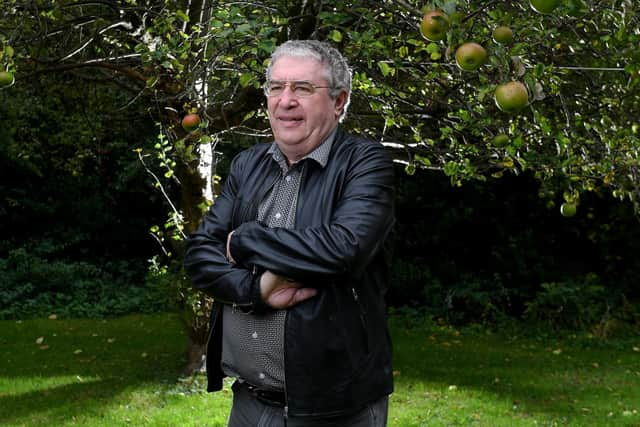Young people today can't imagine the job security we used to have in the 1970s, says Yorkshire's Unison General Secretary hopeful Paul Holmes
and live on Freeview channel 276
But Wakefield, one of the centres of the 1980s' miners' strike, retains its reputation for having a strong trade union presence. And as organised labour movements wrestle with a host of challenges their predecessors would never have had to consider, recent months have seen two major unions elect leaders from the West Yorkshire city chosen as their general secretaries.
Miners' daughter Jo Grady, who was born in Wakefield and studied at Wakefield college, stormed to victory in the race to lead the University and College Union. And Sarah Woolley went from working at Greggs in Wakefield to being first ever woman to lead the Bakers, Food and Allied Workers' Union.
Advertisement
Hide AdAdvertisement
Hide AdHoping to make it a hat-trick of senior union officials hailing from Wakefield is Paul Holmes, who was born in Doncaster but has lived in Wakefield since the age of 15.
The veteran branch secretary of Kirklees Unison is in the running to become General Secretary of the organisation, one of the biggest trade unions in the country with 1.3 million members.
Despite running as a lay candidate, meaning he is not employed by the union, he has secured more than 100 nominations ahead of the election later this year as well as a host of high profile backers including former shadow chancellor John McDonnell, film-maker Ken Loach and actress Maxine Peake.
One of four likely names on the ballot paper, the 65-year-old father-of-two says he has an "evens" chance of succeeding current General Secretary Dave Prentis in the hugely influential position.


Advertisement
Hide AdAdvertisement
Hide AdHis strong position, defying the tradition that top union jobs are almost always given to elected officials rather than lay members, comes on the back of several eye-catching policies.
Promising to continue on his salary of £32,000, and to give the remainder of the role’s six-figure salary to charity, he tells potential voters: "I'm saying I want to be on the same terms and conditions and pay as you're on, because that's what I've been doing for 40 years."
He has also spoken of selling off Unison’s two large headquarters buildings, worth around £100m, so the funds can be put to better use.
And he proposes radical changes to the way the union operates, doubling the proportion of members subscriptions that go to its branches rather than the head office and requiring that all its top jobs are elected.
Advertisement
Hide AdAdvertisement
Hide AdHe suggests that while only a tiny fraction of those entitled to stand for General Secretary are Unison employees, it is always someone from this pool who gets the job. "That is what the election is about in a lot of respects, that a lot of branches think unions need changing", he says. "There is a lot of dissatisfaction with the union."
Mr Holmes was one of three Kirklees officials suspended last December pending an investigation into “serious and confidential issues”.
The veteran branch secretary of Kirklees Unison was suspended by the council. His colleagues branch chairman Nick Ruff and assistant branch secretary Cath Kinder were suspended by the union.
As of July this year the trio was still under investigation, though both the council and the union remained tight-lipped about the suspensions and the lengthy investigation that followed.
Advertisement
Hide AdAdvertisement
Hide AdHe also made headlines as a result of his involvement with council bin workers in Kirklees who threatened to strike over claims of victimisation including bullying, racism and “heavy-handed” management. He was described by one union member as “a consistent thorn in the council’s side”.
Attending a Wakefield comprehensive school nearly five decades ago, he recalls a careers officer turning up and saying 20 pupils at the school would have to agree to work for the council or none of them could leave.
"That was the recruitment process," he says. "That is a world that young people can't imagine now. Everybody knew there was a job somewhere. The atmosphere was unbelievable, I've known people start work in the morning, get another job at dinner time and then another one in the afternoon.
"From a trade union point of view it was a different world, if you were getting bullied or harassed or felt uncomfortable at work, you could move on. Whereas now you have to put up with all sorts because people are thinking 'where am I going to get a job'."
Advertisement
Hide AdAdvertisement
Hide AdPart of his motivation to take high office is the different world facing today's young workers compared to in his youth, when jobs came with benefits and security for life. Modern employment practices and zero-hours contracts have given managers the whip hand, he says, and made it much harder to find secure employment. "If I was the younger generation now I'd blame the previous generations," he says.
And it was the miners' strike, which Mr Holmes says "made me see what was going on in this country", which he believes was the turning point.
"For me, in 2020, that was the changing point in people's working conditions," he says. "People's general thoughts were, things are getting better, every generation is better than the time before, up to that point. Whereas now, I don't think anybody thinks that's what facing this generation is as good as what was there 40 years ago."
Comment Guidelines
National World encourages reader discussion on our stories. User feedback, insights and back-and-forth exchanges add a rich layer of context to reporting. Please review our Community Guidelines before commenting.